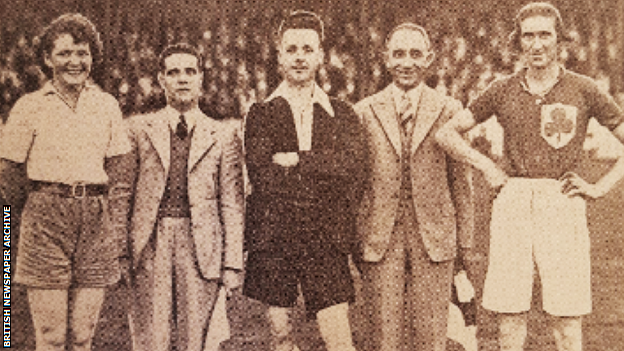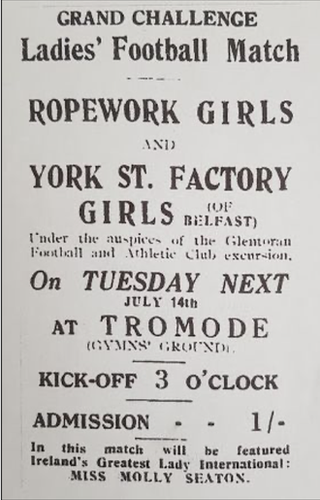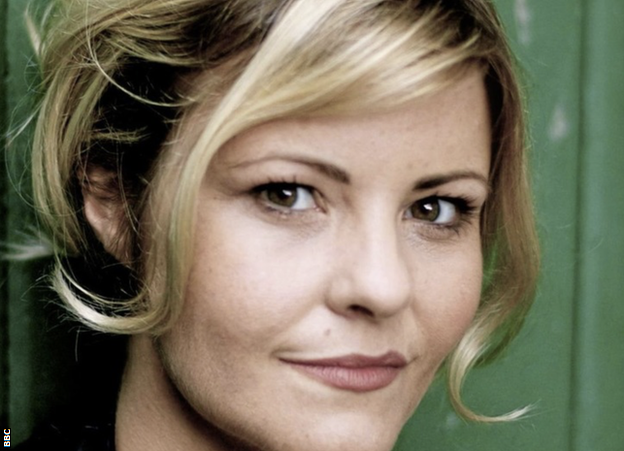The Northern Ireland trailblazers for women's football
- Published

Molly Seaton (right) at the coin toss for an Ireland international against France at Grosvenor Park in Belfast
The recent decision by Brazil's football association (CBF), following the English FA, to adopt pay parity for the men and women's international teams is a belated acknowledgement of the football for all mantra.
A century ago such a prospect would have been met with guffaws and peals of laughter from the male-dominated Football Association as the Scottish aristocrat Lady Florence Dixie and the wonderfully named Nettie Honeyball toiled at establishing the British Ladies Football Club.
During World War One from 1914-18, the men's leagues were suspended and the women, whose home front duties included heavy manufacturing and agriculture work, also helped to keep football alive.
Initial reticence to women playing the beautiful game waned as teams including Blyth Spartans, St Helens Ladies FC and a famous Preston ammunitions factory team - Dick, Kerr Ladies, boosted national morale and built huge followings along the way.
In industrial Belfast, too, women's teams were organised to play exhibition matches and help raise much-needed funds for charity. If Lancashire had its sporting personalities Lily Parr and Lizzy Ashcroft, Belfast had the Shore Road's Mary Ann Seaton (1905-1974)
Nicknamed 'Big Molly', Seaton turned out for several teams including Castle Rovers and Ireland. Accounts suggest that she was a fearless defender in the mould of Peter Rafferty or Allan Hunter.

Molly Seaton was the star attraction for women's football games
Seaton's drawing power was such that the mention of her name on any advertising notice would swell the attendance - early evidence of a successful PR machine in operation.
In post-war Britain, envy at its popularity, rather than any hard evidence of malpractice, seemed to be the motivation behind the FA's decision in December 1921 to instigate a 50-year prohibition on women's football from venues under its control.
Ironically, at a time where the men's game was devoid of any financial transparency, part of the reasoning was because 'an excessive proportion of the receipts are absorbed in expenses and an inadequate percentage devoted to charitable objects'.
Thankfully the women's game chose another path and in the Irish League grounds remained available. According to Belfast actor Tara Lynne O'Neill, who has been researching the period for her play Rough Girls (on hold because of Covid-19), the Irish FA archives hold no records of that period.
"It's almost as if the women's game never existed," says O'Neill, known for her role as Ma Mary in the hugely popular Channel Four comedy series Derry Girls, stints in The Fall and Line of Duty or wooing the audiences with her portrayal of Shirley Valentine at Belfast's Lyric Theatre last year.
"Rough Girls is about the place of women in football. It's at the time of partition when football on the island split in two and people were forced to take sides.
"Men, whose matches were played in the dangerous atmosphere of the civil unrest, were suggesting that it was unsuitable for women to play. In contrast, politics stayed out of the women's games which were more family orientated. Crowds continued to flock to their matches."

Tara Lynne O'Neill aims to bring the history of women's football to life in 'Rough Girls'
In October 1921, 16,000 attended a game at Windsor Park between Belfast Ladies and Dick, Kerr's Ladies. Other tour matches were given international status. During that period one Belfast Hospital Sports Gala Committee meeting reported that £2,000 - something in the region of £90,000 now - had already been raised for vital causes.
A proposed match between 'Mrs W Scott's team and a team of ladies brought from France' was stated to require a guarantee of £600 in order to be staged.
The Warrior Day Fund, the Billy Parish Church Bazaar and the Shipwrecked Mariners Society were among those to benefit from many of these exhibition matches where everyone had to pay the entrance fee to watch some of the pioneers of the women's game in action.
Additional bonuses could include warm-up five-a-side matches and the occasional appearance from Belfast's Lady Mayoress to perform the kick-off. On one occasion, through the kindness of a Mr HL Garrett, 'the visiting team took part in a Co. Down coast charabanc tour and were entertained to tea by Mr Johnston at Crawfordsburn'.
"Players like Molly Seaton, Lily Parr and my grandmother Lizzy Ashcroft were trailblazers, part of the reason why women's football has survived," says Steve Bolton, who discovered more about Ashcroft's career with the Dick, Kerr Ladies (DKL) when he opened some old suitcases stored in the loft of her home.
"Lizzy made her debut for St Helens against Stoke in 1921. There were 30,000 at the game. She later joined up with Lily Parr at DKL."
Talks are in hand for a possible gallery at Manchester's National Football Museum.
"It is exciting for my family to have discovered this bit of football history. It would be appropriate if the Irish FA did something similar to honour the memory of Molly Seaton."